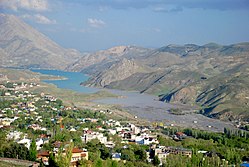Lavasan
Lavasan
لواسان | |
|---|---|
City | |
 | |
| Coordinates: 35°49′23″N 51°37′27″E / 35.82306°N 51.62417°E | |
| Country | |
| Province | Tehran |
| County | Shemiranat |
| Bakhsh | Lavasanat |
| Population (2016 Census) | |
• Total | 18,146 [1] |
| Time zone | UTC+3:30 (IRST) |
| • Summer (DST) | UTC+4:30 (IRDT) |
Lavasan (Template:Lang-fa, also Romanized as Lavāsān) is an affluent town in Shemiranat County, Tehran Province, Iran. At the 2011 census, its population was 28,558, in 7,645 families.[2][3] The Jajrood River flows through Lavasan. Situated 11 kilometers northeast of Tehran, Lavasan is known for its excellent weather and the luxurious mansions. The city is home to many upper-class and wealthy families. Some Iranians call it the Beverly Hills or Switzerland of Tehran.
The city of Lavasan is part of the Lavasanat district. Together with the Rudbar-e Qasran district, it constitutes the subprovince of Shemiran in the Tehran Province.[4]
Lavasan has an area of 70 square kilometres.[5] Two main parts of Lavasan are Great Lavasan (Lavasan Bozorg) and Little Lavasan (Lavasan Koochak). Until the construction of Road_59_(Iran) and other routs to the North of Iran, Great Lavasan one on a trade path between Tehran and North of Iran. In the ealy 1900s Great Lavasan was home to several affluent families with many unique and thriving orchards, hence the name "Great Lavasan". Currently Great Lavasan is less populated than the Little Lavasan due to influx of new residents moving to Little Lavasan from other cities. Great Lavasan has access from the Jajrood road while the Little Lavasan has access from the Behind the Latian Dam and have different areas including Saboo Bozorg, Saboo Koochak, Tork Mahale, Seied Paiz etc.
Etymology
The name of Lavasan is a Middle Persian (Pahlavi) word which means "The Mount Blade of Sunrise" or "Mountaintop of Sunrise". It refers to Mount Damavand that is located in the middle Alborz Range in the east of Lavasanat District.
History
In the 19th century, during the Qajar era, Lavasan was reportedly a large village, with some 500 houses and about 200 inhabitants.[4]
Under Mohammad Reza Pahlavi, in the 1960s, a hydroelectric dam was built in the southeast of the village.[4]
People
The natives of Lavasan are of Caspian origin.[4] The local dialect or "vernacular" spoken by its natives is a mix of Persian and Caspian.[4]
Notable residents[6]
Climate
Lavasan has a cold semi-arid climate (Köppen climate classification: BSk) with significant continental influences.
| Climate data for Lavasan | |||||||||||||
|---|---|---|---|---|---|---|---|---|---|---|---|---|---|
| Month | Jan | Feb | Mar | Apr | May | Jun | Jul | Aug | Sep | Oct | Nov | Dec | Year |
| Mean daily maximum °C (°F) | 4.5 (40.1) |
7.5 (45.5) |
12.5 (54.5) |
19.1 (66.4) |
26.3 (79.3) |
31.5 (88.7) |
34.4 (93.9) |
33.9 (93.0) |
29.5 (85.1) |
22.5 (72.5) |
14.1 (57.4) |
7.8 (46.0) |
20.3 (68.5) |
| Daily mean °C (°F) | −0.8 (30.6) |
2.0 (35.6) |
6.4 (43.5) |
12.3 (54.1) |
18.8 (65.8) |
23.4 (74.1) |
26.2 (79.2) |
25.9 (78.6) |
21.4 (70.5) |
15.3 (59.5) |
8.0 (46.4) |
2.5 (36.5) |
13.5 (56.2) |
| Mean daily minimum °C (°F) | −6.1 (21.0) |
−3.5 (25.7) |
0.4 (32.7) |
5.5 (41.9) |
11.4 (52.5) |
15.3 (59.5) |
18.1 (64.6) |
18.0 (64.4) |
13.3 (55.9) |
8.1 (46.6) |
1.9 (35.4) |
−2.8 (27.0) |
6.6 (43.9) |
| Average precipitation mm (inches) | 30 (1.2) |
27 (1.1) |
32 (1.3) |
28 (1.1) |
18 (0.7) |
4 (0.2) |
2 (0.1) |
1 (0.0) |
1 (0.0) |
8 (0.3) |
15 (0.6) |
21 (0.8) |
187 (7.4) |
| Source: [7] | |||||||||||||
Gallery
See also
References
- ^ https://www.amar.org.ir/english
- ^ "Census of the Islamic Republic of Iran, 1385 (2006)" (Excel). Statistical Center of Iran. Archived from the original on 2011-09-20.
- ^ Lavasan can be found at GEOnet Names Server, at this link, by opening the Advanced Search box, entering "217990" in the "Unique Feature Id" form, and clicking on "Search Database".
- ^ a b c d e Encyclopaedia Iranica 2017.
- ^ http://www.itc.nl/library/papers_2007/msc/gfm/alian.pdf
- ^ lavasani genealogical tree presented in Ayatollah Sadeghi in Qum.
- ^ "Climate: Lavasan". Climate-Data.org. Retrieved January 5, 2019.
Sources
- Encyclopaedia Iranica (2017). LAVĀSĀN.
{{cite encyclopedia}}: Invalid|ref=harv(help)





